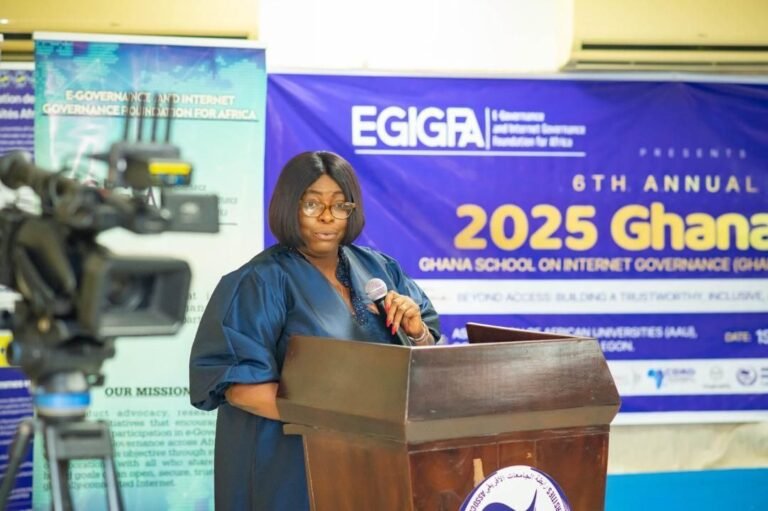Madam Kate Addo, Coordinating Director of the Public Affairs Subdivision at the Parliament of Ghana, has called for greater digital literacy and responsible online behavior to counter the dangers of misinformation and cybercrime.
She made the call while delivering the keynote address at the Sixth Annual Ghana School on Internet Governance (GhanaSIG) Fellowship held in Accra.
Organized by the E-Governance and Internet Governance Foundation for Africa (EGIGFA), the GhanaSIG Fellowship is a capacity-building initiative designed to train individuals in Internet Governance (IG) through a blend of online learning and a week-long in-person training session.
The 2025 edition was held under the theme: “Beyond Access: Building Trustworthy, Inclusive and Open Internet for All.” In her address, Madam Addo emphasized that Internet Governance refers to the collaborative process through which decisions and policies guiding the development, operation, and use of the internet are made.
She noted that this involves a broad spectrum of stakeholders—including governments, civil society, private sector actors, technical experts, and international organizations—working together in a participatory, rights-based, and globally coordinated manner.
“A good governance regime requires collaboration from governments, civil society, and the private sector. A clear example of this is how increased access to the internet and digital technologies creates opportunities for social and economic development.” she stated. “
Madam Addo, however, warned of the growing threat of online misinformation, disinformation, and cybercrime, which she said could erode public trust and endanger individual safety. She stressed the need to proactively safeguard digital spaces through awareness, regulation, and education.
She noted that even market women, farmers, and rural dwellers use the internet daily for business and leisure, demonstrating how far-reaching its impact is. While highlighting the internet’s benefits, such as educational advancement, skills development, and social connectivity, she also cautioned about its darker sides. These include exposure to inappropriate content, cyberbullying, online exploitation, addiction, privacy risks, and diminished well-being.
According to her, excessive screen time could lead to sedentary lifestyles and related health issues, while fear of digital exclusion may result in social anxiety.
Touching on the theme of the event, Madam Addo underscored the importance of not only ensuring internet access but also putting in place measures to protect vulnerable users, especially children. She cited global statistics indicating that 33% of children under 18 are online, and data from the U.S. National Centre for Education Statistics showing that 91.2% of children aged 3 to 18 use the internet, with 89.3% accessing it at home.
Bringing the focus to Ghana, she said 90.5% of children aged 8 to 17 have internet access, with many beginning to use it as early as age 12. Additionally, 45.7% of these children use smartphones while 21.6% access the internet via laptops or computers.


